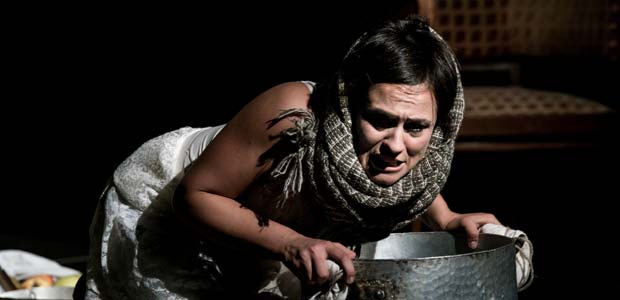“Angela’s Wars” (a Nuvole Associazione Teatrale production) comes from Giuseppina Facco’s idea and with the collaboration of Andrea Bavecchi and the direction of Annapaola Bardeloni. It’s a show that Giuseppina deeply wanted and that is dear to her; it was selected for the Torino Fringe Festival in 2016 and for the Milano OFF Festival in 2017. The show is set in 1915, the war has just started. Men left and only wives, mothers, and daughters are left home. The world has changed, just in a few months. The life of Italian women has changed. “Angela’s Wars” brings us back there, during the war, and shows us the life of four women: a teacher, a farmer, a prostitute, and an official’s wife. All of them are named Angela.
How was this project born?
I was on the train from Bologna to Savona. I was going back after working for Andrea Battistini’s Lisistrata: for two months I had been immersed in the war experienced through women’s eyes. It was an intense period, full of emotions. I was thinking about writing my own text on the war; I had been thinking about doing it for a while. My grandma told me many of her memories of the war, the Second World War. I grew up with those stories which were told with such a magic and irony that only my grandma could use. They were stories of people, values, feelings, passions, everyday life. Going back to the train. I was on the Bologna-Savona intercity. I had a book in my hands: “Il dovere o la ragione, Diario di Un cecchino italiano a Serra Neve” – Duty or Reason, Diary of an Italian Sniper in Serra Neve – that that day was given to me by Andrea Bavecchi, who is an expert in War and a great connoisseur of the First World War. A friend just told him about my project and he came to me from Florence to give me two of his books on the Great War, to meet me, and to learn about the project. I started to read the beginning of the book. The narrator was a boy, a young man, in his early twenties. He wrote about his experience in the war and his detention.
When I realized that what I was reading was not only a simple book, but a diary; and that he didn’t write those words while he was actually living those hard and terrible experiences; and that his words were a way to preserve his life experiences – and for me, who was reading them 100 years later, I burst into tears from the emotion. “From the Country we aren’t receiving anything, but it’s true, I believe, that we have been forgotten and left to our destiny and to our job as suffering prisoners. On my part, I spend my coins, that I hid when I was captured, to buy an inkwell, a nib on a wooden stick, some ink, and a pencil that I have to sharpen on a pointed rock, since keeping knives or razors is not allowed. I get the paper, which is another rare treasure, from here and there depending on where I find it. The Austrian who is in charge of the cabin, who is also a smuggler, didn’t believe it when I held out 15 kroners for a box of stationary, being used to get money in exchange for clothing, food, and medicine. I don’t think I have wasted my money because I want to organize my daily journal that I have been keeping for the past 11 months of war. I want to do it because I want to leave a legacy, not only to myself, but also to others, so they can learn, understand, and live, in a comprehensible and legible way, what I have lived alone and with others.” [Andrea Bavecchi, edited by Davide Tonazzi, “Il dovere o la ragione, Alpi Giulia, Ottobre 1917 – Diario Il dovere o la ragione, Alpi Giulie, Ottobre 1917 – Diario di un cecchino italiano a Sella Nevea.] So I decided to take the accounts of many others like him and to tell them, so their words, their thoughts, and their stories won’t be forgotten.

What are the strong points of the show? Why should people go watch it?
“Angela’s Wars” is an avalanche of memories, emotions, feelings, and values told by four women who lived through the War. It’s a show that touches you, that affects you emotionally. Through the voices of these four women the audience relives the history of the war, not only from their point of view, but from the perspective of an entire population. Each one of us has something of Angela inside. The response of the audience shows that the show is involving, moving but not too oppressing, and it portraits the entire world of women that was involved in the war in just a few brushstrokes. Someone wrote to me saying that this is a show you need to go watch if you want to reflect, in a pleasant way, on aspects of the Great War that you probably never talked about when you were in school.
What does it mean to you to perform in New York?
It means having the opportunity to bring the Italian culture and our history to all the people that, even though they have been living overseas for generations, have not forgotten their Italian origins, but, above all, it is an opportunity to give them a dear memory from their fathers and grandfathers, from their Country and their origin’s history and experience. A very important piece of history that pertains to all of us.
Who is Angela and what are her wars?
Angela is all the women that experienced the war, but she is also the husbands, the sons, the soldiers. Angela is many point of views, is the war seen from many different angles. Each Angela carries many people’s stories, the battles that many women and men experienced in their everyday life in those terrible years. But Angela is also a name, a common name that can be any woman. We are Angela when we have to wait for other people’s decisions, we are Angela when we are waiting for a small signal, when no one notices anything we do, when we have to always lower our head and look for a mediation between life, our and other’s necessities, we are Angela in our harsh, complex daily life which is often heavy and, above all, not always recognized. We are Angela because a woman is Angela, always, forever, anywhere, because for a woman it is not necessary to have a war “outside” since war is the normality of everyday, because no one can teach a woman the meaning of the words “waiting,” “understanding,” “keeping quiet,” “suffering,” “helping,” because she has always known them. No woman interprets Angela, because a woman, we the women, just needs to behave naturally, as it happens every day out of time, out of space, we are moved by the consciousness that everything was built and will be built thanks to us as well. In conclusion, we are “Angela’s wars.”

The show is set during the Great War. Did you research something in particular to create the historical contexts and characters?
Absolutely. I had Andrea Bavecchi’s precious help, a Florentine historian and researcher who is an expert in war matters and war techniques. He provided the accounts for the creation of the four stories and helped me write the script. I also read numerous journals and material on the War in general. The research was very long: I read material for about a year. When you undertake jobs of this kind the risk is that it will end up in a “bulimia” of information, while at a certain point, you should stop and create the work starting from what you’ve collected up to that moment. But for me it was impossible. I knew I was dealing with an endless field: the writings and the material on the topic are infinite. I especially dedicated myself to the reading of soldiers’ journals, of letters, and manuscripts, but then I wanted to deepen the historical aspects, the facts, I read essays on that historical period and social and political mechanisms of that time, on the area. But then I went back to the journals and letters, because that was the material I was interested in and that I used to create my four characters.
What was your approach to interpret the four different characters from an acting perspective?
First of all, the four Angelas are not the same age, they are from four different social classes, four different geographical features, and four different life experiences. They come from experiences that are completely different one from the other; they are living the same reality, but they have different approaches. The farmer lives in the present, in the immediacy, in the concreteness; the official’s wife lives in suspension tied to the past, in the impotency; the teacher is projected to the future; the young prostitute has a whole different situation of her own. All these influences a lot of the four figures. Moreover, I worked physically, imagining four precise people, who are very clear in my mind: weight, height, physical structure. I imagined I could put their bodies in specific situations, in their reality, trying to understand what the implications were. A woman who works the land carries herself differently from a woman who’s from an upper social class. I also worked on the language and on some dialectal inflexions for the characters of the farmer and the prostitute.
Angela’s Wars will be on stage at Casa Italiana Zerilli-Marimò on May 15th at 8p.m. and at The Brick Theater of Brooklyn on May 17th at 8p.m.
For more information: InScena!
Translated by Giulia Casati.












